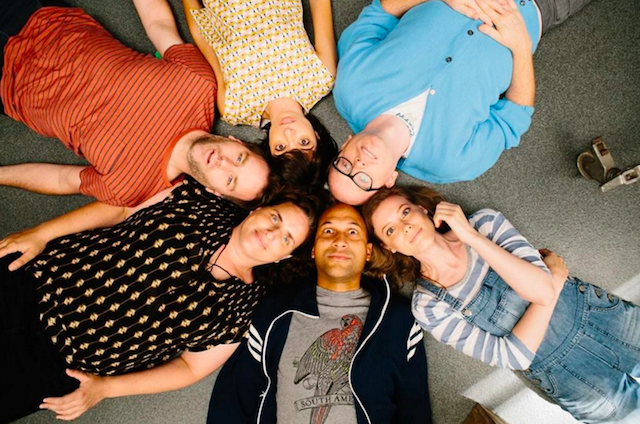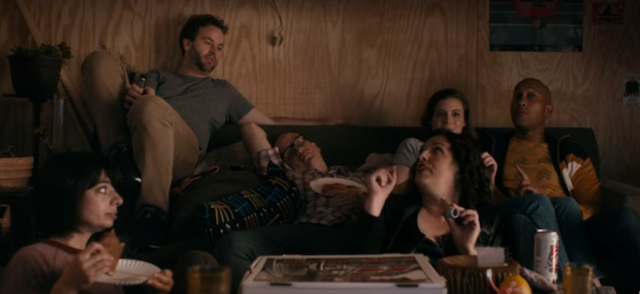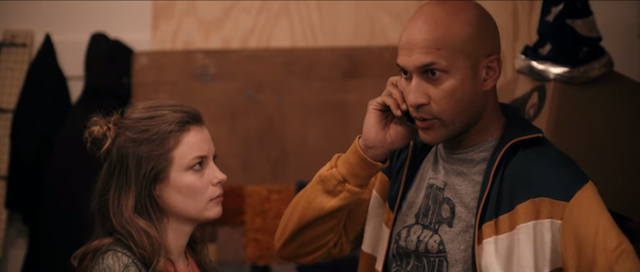
[mild spoilers ahead]
There’s a line in Don’t Think Twice, Mike Birbiglia’s new film about a scrappy improv comedy group from Brooklyn, that resonates with anyone who’s pursued a creative career without (yet) reaching the traditional benchmarks of success: “Your 20s are all about hope. And your 30s are all about how dumb it is to hope.” It’s delivered by Bill, a dead-pan, diffident guy in his early thirties who can kill on the improv stage, but whose day job entails handing out hummus samples at Whole Foods. (Ironically, Bill is played by Chris Gethard, one of the more successful comedians to come out of Brooklyn’s alt-comedy scene.) “Without improv, I’m kind of a loser,” he says in another scene.
These sentiments are shared by his fellow improv members, who drink together, complain together, live together (a few of them bunk up in Bushwick) and perform together in a UCB-esque improv group called The Commune. They’re each riddled with anxiety and self-doubt about their talents and what the future holds for them in comedy, but they know how to hold each other up, as the tenet of improv would have it: the group is greater than the individual.
That is, until one member, Jack, played by Keegan-Michael Key, gets hired by Weekend Live, (read: SNL), and the group unravels into a messy bunch of individuals with fragile egos and given to petty resentments. It doesn’t help that the news comes soon after they’ve learned that the lower Manhattan theater where they perform has been bought by Trump Towers and will be replaced by an Urban Outfitters (sound familiar?).
Yet, Birbiglia’s film, a coming-of-age tale for aging creatives — staunchly in their thirties, unlike the characters in similar tales of this ilk, like Frances Ha — isn’t about either hitting the big time, or giving up and doing something more practical. It proposes a more fluid notion of success, one that means different things for different people.
Don’t Think Twice — which, unitalicized, is another improv principle that applies to life — is a celebration of living in the moment, pursuing your passion, and finding the path that’s right for you. Success is self-defined; each character, although initially devastated by Jack’s big move, slowly begins to chart their own path forward.
________

For Miles, (Birbiglia), the embittered 36 year-old founder of the group who can’t stop reminding everybody that he was “inches away” from landing a spot at Weekend Live himself, it takes an unexpected development in his personal life for him to finally be OK with himself. Jack’s breakout role is hardly a cakewalk, as he struggles to come up with weekly material good enough to keep him from getting fired after the first season and tries to navigate his now-strained relationships with the group, especially with his girlfriend Sam (Gillian Jacobs).
When he tells her “you can’t do improv forever” urging her to “jump to the next lily pad,” she asserts, “I like my life how it is right now.” As maybe the most rawly talented, captivating improv actor in the group, there’s no reason she shouldn’t. Lindsay, (Tami Seghar) a pothead who lives off her parent’s dime, gets an opportunity that forces her to finally work really hard at something. Some bad news forces Bill to put his personal misgivings in perspective, and for Allison, (Kate Miccuci), finishing her graphic novel gives her the most validation.
________

The film partly vindicates the broke artist lifestyle by privileging caring about things over selling out. Of course, caring about things doesn’t usually pay, or guarantee professional acclaim, an unfortunate reality that folks pursuing creative fields across the board — writers, musicians, artists — have to confront, especially living in NYC. But do you take the steady, square job — or the flashy hot-shot gig — so you can start paying back more than just the interest on your student loan debt and build up some security for the future, and relegate your passion to an after-work, weekend side project?
Can you do both, or will your songwriting or illustrating or novel-writing suffer, as the bulk of your energy gets drained each day at the office? Do you stick it out in the trenches doing what matters to you, financial woes be damned, because this is your only chance? And if you don’t ever get that big break, however you envision it, and you’re approaching 40 living in an apartment that looks like a college dorm, but you’re doing work that matters to you: is there anything inherently wrong with that?
Don’t Think Twice suggests the possibility that what you’re doing right now is just fine, even if you’re getting up there in years. Ironically, as the characters’ arcs play out, the main tenets of improv get turned on their head. While its characters preach “yes, and” on the stage, they learn that in life it’s OK to say no to the glitzy, higher paying thing, if it doesn’t feel right. Or to, actually, think twice about whether or not the dream you’re working towards is the one that’s makes sense for you. And to shed the groupthink, if it means needlessly comparing yourself to others, since meaning is relative, and you can only find it by looking inward. We’re all making it up as we go along, anyway.
Leave a Reply



